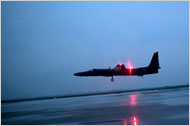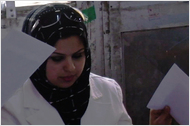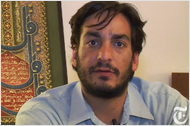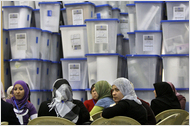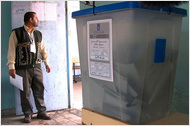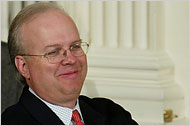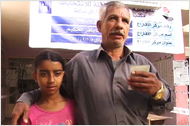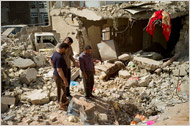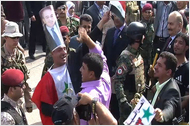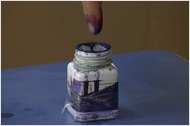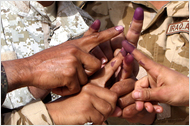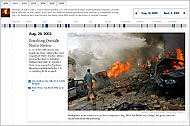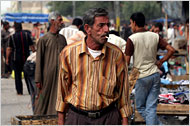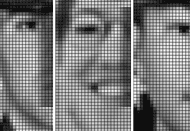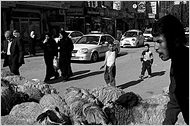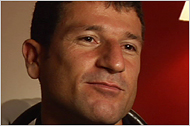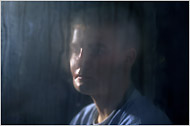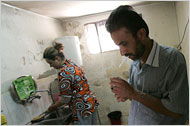Notes from Afghanistan, Pakistan, Iraq and other areas of conflict in the post-9/11 era.
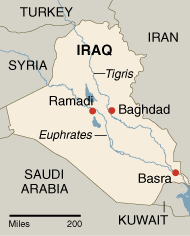
Almost seven years after the American invasion of Iraq, the country held national elections on March 7, 2010, that illustrated how far the country has come and how far it has to go in its hoped-for transformation into a stable, secure democracy.
Insurgents launched a wave of violence meant to disrupt the vote, with 100 attacks in Baghdad alone. At least 38 people died, but the turnout was higher than expected. Sunnis who largely boycotted previous elections voted in force, and an intense competition for Shiite votes drove up participation in Baghdad and the south. It was arguably the most open, most competitive election in the nation's long history of colonial rule, dictatorship and war.
A week after the vote, partial results suggested a sharp and divisive shift in power, with a secular candidate challenging Prime Minister Nuri Kamal al-Maliki and old alliances fracturing against a surge of dissident movements. Traditional Kurdish and Shiite Arab alliances were confronted with movements that contested their claims to leadership, in particular the followers of the radical cleric Moktada al-Sadr, who fought the Americans twice in 2004. Sunni Arab voters were newly emboldened in an election in which they forcefully took part under the banner of a secular alliance.
But in many ways, the vote solidified ethnic and sectarian divisions unleashed by the American-led invasion in 2003. Despite a conscious effort by most parties to appeal to nationalist sentiments, people still voted along the lines of identity. Those demarcations of Sunni Arab, Shiite Arab or Kurd have bedeviled attempts to solve the country's most pressing issues, including borders disputed between Arabs and Kurds and the power of the federal government in a country still haunted by decades of dictatorship.
In the broadest strokes, the results confirmed some expectations before the election, a milestone in American plans to withdraw all but 50,000 troops by August. Mr. Maliki was winning significantly in six of Iraq's nine southern provinces, populated by the country's Shiite majority. The coalition led by Ayad Allawi, a secular Shiite and former prime minister who has emerged as a default leader for Sunnis, scored gains in Iraq's Sunni provinces, sometimes overwhelmingly.
The results seemed to set the stage for a period of turmoil — months, not weeks, politicians here predict — as the winning coalition tries to cobble together enough votes to elect a prime minister.
At stake is not only the question of who will lead Iraq, but of whether the American military will be able to stick to a timetable that calls for large-scale troop withdrawals later in 2010. By August, the number of troops is set to be down to 50,000, and they would be restricted to non-combat roles.
THE INVASION OF IRAQ
Almost immediately after ousting the Taliban from power in Afghanistan following the attacks of Sept. 11, 2001 — some argue, even before — President George W. Bush began to press the case for an American-led invasion of Iraq. He cited the possibility that Saddam Hussein still sought nuclear, biological and chemical weapons in defiance of United Nations restrictions and sanctions. Mr. Bush and other senior American officials also sought to link Iraq to Al Qaeda, the terrorist organization led by Osama bin Laden that carried out the Sept. 11 attacks. Both claims have since been largely discredited, though some officials and analysts continue to argue otherwise, saying that Mr. Hussein's Iraq posed a real and imminent threat to the region and to the United States.
In his State of the Union address in 2002 , Mr. Bush linked Iraq with Iran and North Korea as an " axis of evil. '' In his 2003 address , Mr. Bush made it clear the United States would use force to disarm Mr. Hussein, despite the continuing work of United Nations weapons inspectors in Iraq, and despite growing international protests, even from some allies. A week later Secretary of State Colin L. Powell made the administration's case before the United Nations Security Council with photographs, intercepted messages and other props, including a vial that, he said, could hold enough anthrax to shut down the United States Senate.
The invasion of Iraq began on March 19, 2003—the early hours of March 20 in Iraq—when Mr. Bush ordered missiles fired at a bunker in Baghdad where he believed that Saddam Hussein was hiding. Within weeks, with a "coalition of the willing" and disputed legal authority , the United States quickly toppled Mr. Hussein's government, despite fierce fighting by some paramilitary groups. The Iraqi leader himself reportedly narrowly avoided being killed in the war's first air strikes. The Army's Third Infantry Division entered Baghdad on April 5, seizing what was once called Saddam Hussein International Airport. On April 9, a statue of Mr. Hussein in Firdos Square was pulled down with the help of the Marines. That effectively sealed the capture of Baghdad, but began a new war.
CHAOS AND INSURGENCY
The fall of Iraq's brutal, powerful dictator unleashed a wave of celebration, then chaos, looting, violence and ultimately insurgency. Rather than quickly return power to the Iraqis, including political and religious leaders returning from exile, the United States created an occupation authority that took steps widely blamed for alienating many Iraqis and igniting Sunni-led resistance. They included disbanding the Iraqi Army and purging members of the former ruling Baath Party from government and public life, both with consequences felt to this day. On May 1, 2003, Mr. Bush appeared on an American aircraft carrier that carried a banner declaring " Mission Accomplished ," a theatrical touch that even the president years later acknowledged sent the wrong message.
In the security and political vacuum that followed the invasion, violence erupted against the American-led occupation forces and against the United Nations headquarters, which was bombed in August 2003, killing the body's special representative, Sergio Vieira de Mello. The capture of Saddam Hussein in December 2003—the former leader was found unshaven and disheveled in a spider hole north of Baghdad—did nothing to halt the bloodshed. Nor did the formal transfer of sovereignty to the Iraqi people in June 200, which took place a few months after the publication of photographs showing the abuse of prisoners at Abu Ghraib had further fueled anger and anti-American sentiment.
In January 2005, the Americans orchestrated Iraq's first multi-party elections in five decades, a moment symbolized by Iraqis waving fingers marked in purple ink after they voted. The elections for a Transitional National Assembly reversed the historic political domination of the Sunnis, who had largely boycotted the vote. A Shiite coalition supported by Grand Ayatollah Ali al-Sistani, the most powerful Shiite cleric, won a plurality, and put Shiites in power, along with the Kurds. Saddam Hussein stood trial, remaining defiant and unrepentant as he faced charges of massacring Shiites in Dujail in 1982.
A new constitution followed by the end of the year, and new elections in January 2006 cemented the new balance of power, but also exposed simmering sectarian tensions, as many Sunnis boycotted. In February 2006, the bombing of the Askariya Mosque in Samarra, one of the most revered Shiite shrines, set off a convulsion of violence against both Sunnis and Shiites that amounted to a civil war. In Baghdad, it soon was not unusual for 30 bodies or more to be found on the streets every day, as Shiite death squads operated without hindrance and Sunnis retaliated. That steady toll was punctuated by spikes from bomb blasts, usually aimed at Shiites. Even more families fled, as neighborhoods and entire cities were ethnically cleansed. Ultimately, more than 2 million people were displaced in Iraq, and many of them are still abroad to this day, unable or too afraid to return.
Arab and Kurdish tensions also ran high. In Mosul, a disputed city in the north, Sunni militants attacked Kurdish and Christian enclaves. The fate of Kirkuk, populated by Arabs, Kurds and smaller minority groups, remains disputed territory, punctured routinely by killings and bombings. After a political impasse that reflected the chaos in the country, Nuri Kamal al-Maliki, a little-known Shiite politician previously known as Jawad al-Maliki, became Iraq's first permanent prime minister in April 2006.
AT HOME
The messy aftermath of a swift military victory made the war in Iraq increasingly unpopular at home, but not enough to derail Mr. Bush's re-election in November 2004. Almost immediately afterwards, though, his approval rating dropped as the war dragged on. It never recovered. By 2006, Democrats regained control of Congress. Their victory rested in large part on the growing sentiment against the war, which rose with the toll of American deaths, which reached 3,000 by the end of the year, and its ever spiraling costs. Saddam Hussein was sentenced to death just before the Congressional elections, and Secretary of Defense Donald H. Rumsfeld resigned the day after the vote, widely blamed for having mismanaged the war.
In the face of rising unpopularity and against the advice of the Iraq Study Group, a bipartisan group of prominent Americans, Mr. Bush ordered a large increase in American forces, then totaling roughly 130,000 troops. He decided to do so after meeting with his advisers over the New Year's holiday weekend, even as Mr. Hussein was hanged in a gruesome execution surreptitiously filmed with a cell phone.
The "surge," as the increase became known, eventually raised the number of troops to more than 170,000. It coincided with a new counterinsurgency strategy that had been introduced by a new American commander, Gen. David H. Petraeus, and the flowering of a once-unlikely alliance with Sunnis in Anbar province and elsewhere. Moktada al-Sadr, the radical anti-American Shiite cleric, whose followers in the Mahdi Army militia had been responsible for some of the worst brutality in Baghdad, declared a cease-fire in September. These factors came together in the fall of 2007 to produce a sharp decline in violence.
Political progress and ethnic reconciliation were halting, though, fueling calls by Democrats to begin a withdrawal of American forces, though they lacked sufficient votes in Congress to force one. Senator Barack Obama of Illinois, an early opponent of the war, rose to prominence in the Democratic race for the nomination in large part by capitalizing on the war's unpopularity. But by the time Mr. Obama defeated Senator Hillary Rodham Clinton for the nomination in 2008 and then the Republican nominee, Senator John McCain, Iraq hardly loomed as an issue as it once had, both because of the drop in violence there and because of the rising economic turmoil in the United States and later the world.
BUSH REACHES AN AGREEMENT
At the end of 2007, Mr. Bush and General Petraeus had succeeded in maintaining the level of American forces in Iraq above what it was before the "surge" began. Mr. Maliki's government, increasingly confident of its growing military might, expanded operations against insurgents and other militants that had once been the exclusive fight of the Americans. The militias loyal to Mr. Sadr, who had gone into exile, were routed in a government-led offensive in southern Iraq, though significant assistance from American forces and firepower was needed for the Iraqis to succeed. By May, the offensive extended to Sadr City in Baghdad, a densely populated neighborhood that had been largely outside of the government's control.
In December 2008, Mr. Bush made a valedictory visit to Iraq, his fourth trip to the country he liberated from Saddam Hussein's rule and then plunged into bloodshed. The visit, intended to celebrate the new security agreements and the newly confident Iraqi sovereignty implicit in them, was instead overshadowed by an Iraqi journalist during Mr. Bush's press conference with Mr. Maliki. Muntader al-Zaidi, a television correspondent, hurled first one shoe, then a second, at Mr. Bush, who ducked and narrowly averted being struck. Hurling a shoe is insult enough, but Mr. Zaidi also shouted: "This is a farewell kiss, you dog." The correspondent, who was beaten, arrested and, his relatives and lawyer said, later tortured, became a folk hero of sorts in the Arab world, though not universally. He was initially sentenced to three years in jail, but Iraq's highest court reduced the sentence to one year. He was released in September 2009 and fled the country after claiming he had been tortured in jail.
American and Iraqi officials spent most of 2008 negotiating a new security agreement to replace the United Nations mandate authorizing the presence of foreign troops. Negotiations proceeded haltingly for months, but Mr. Bush, who for years railed against those calling for timetables for withdrawal, agreed in July 2008 to a "general time horizon." That ultimately became a firm pledge to remove all American combat forces from Iraqi cities by the end of June 2009 and from the whole country by 2011. He also agreed to give Iraq significant control over combat operations, detentions of prisoners and even prosecutions of American soldiers for grave crimes, though with enough caveats to make charges unlikely.
THE MALIKI GOVERNMENT
According to political advisers, Mr. Maliki is intent on changing the nature of Baghdad's relationship with Washington, shifting Iraq's role from a client state to a more equal partner. But internally, the transition from insurgency to politics to governance—a key to stabilizing the country after six years of war—was proving to be anything but steady and sure. Iraq's provincial elections on Jan. 31, 2009, passed with strikingly little mayhem, raising hopes that democracy might take hold.
Mr. Maliki's Dawa party, running as the leader of a coalition called State of Law, was the overwhelming winner, but the bloc fell short of being able to operate without coalition-building. Over all, the results remained divided along sectarian lines, with Shiite-majority provinces choosing Shiite parties and Sunni-majority provinces choosing Sunni parties. The election outcome conveyed a dual message: many Iraqis want a strong central government, rather than one where regions hold more power than the center, but they do not want all the power in the hands of one party.
On the ground in the provinces, however, what happened in the months after the election was something all too familiar to Iraqis: threats, intrigue, back-room deal-making, protests, political paralysis and, increasingly, popular discontent. Almost immediately the campaign for the parliamentary elections began, at least unofficially. Political jockeying and a weakened economy due to oil prices largely stalled progress on most legislative issues.
PLANS FOR WITHDRAWAL
The election is the last major political milestone in Iraq that will be overseen by tens of thousands of American troops, albeit in a largely advisory role. Under the security agreement, the American military returned control of military operations to Iraq's military and police on Jan. 1, 2009.
President Obama, who campaigned on a promise to end the war, entered office that month indicating that he did not intend to waver from his goal. As a senator and candidate, Mr. Obama did not oppose the security agreement negotiated by Mr. Bush's administration, largely because it left him considerable flexibility to carry out his campaign pledges. What was initially unclear was how quickly his administration would move to withdraw American forces, particularly in light of advice from General Petraeus's successor, Gen. Raymond T. Odierno, who had developed a plan for a slower withdrawal - two brigades over six months, compared with one brigade a month. On his first full day in office, he told Pentagon officials and military commanders " to engage in additional planning necessary to execute a responsible military drawdown from Iraq. '' A month later, he announced a plan to withdraw all combat troops by August 2010, leaving only 35,000 to 50,000, who would then leave Iraq by December 2011. The timetable was only slightly longer than he had pledged during the campaign.
At the end of June 2009, also in keeping with the security agreement, the vast majority of American troops withdrew from Iraq's cities, garrisoning themselves on vast bases outside. Mr. Maliki declared June 30 a national holiday, positioning himself as a proud leader who ended the foreign occupation of Iraq. By the end of July, there were no longer any other nations with troops in Iraq - no "multi" in the Multi-National Force. As Iraqi forces have increasingly taken the lead, the United States became the last of the "coalition of the willing" that the Bush administration first assembled in 2003. The withdrawal from the cities - and the reduction in active combat roles - showed in declining American casualties. In December 2009, for the first time since the war began, no American soldier died in a hostile act.
Mr. Maliki's fanfare about ending the occupation rang hollow for Iraqis who feared that their country's security forces were not yet ready to stand alone. A series of catastrophic attacks in August, October, December and January 2010 - striking government ministries, universities, hotels - only heightened anxiety and suspicion among Iraqis.
THE 2010 CAMPAIGN
Mr. Maliki, hoping to build on his success in the 2009 provincial elections, sought to form a broader, cross-sectarian coalition that would include Sunnis, Kurds and other minority groups. Other parties followed suit, appealing for “national unity” in a country where it has rarely before existed, and only then a unity ruled by an iron hand. Mr. Maliki refused to join another, largely Shiite coalition, called the Iraqi National Alliance, which included many of those with whom he formed the country’s first parliamentary majority.
They faced a formidable challenge from a coalition led by Ayad Allawi, a Shiite who served as interim prime minister before the 2005 elections. Mr. Allawi’s alliance, called Iraqiya, drew broader support across the country’s sectarian lines, attracting Mr. Hashimi, the Sunni vice president, and Saleh al-Mutlaq, a Sunni lawmaker who was the most prominent candidate barred from running in March’s election. Jawad al-Bolani, the interior minister, formed a similar coalition with one of Anbar’s most prominent sheiks.
The election was originally scheduled for January, but was delayed for months by political bickering. A fight over the election rules prompted a veto by one of Iraq's two vice presidents, Tariq al-Hashimi, who said Sunni Arabs inside and outside the country faced disadvantages. Then in January a parliamentary commission with disputed legal standing disqualified more than 500 candidates on the grounds they were former members of Saddam Hussein's Baath Party or remained sympathetic to it.
The disqualifications — on grounds that have even now not been made public — reignited sectarian tensions that are never far from the surface, and the turmoil raised questions about the strength of Iraq's democratic institutions. The murky process was orchestrated by two candidates in the election, including Ahmad Chalabi, a former exile who was warmly embraced by American officials who lobbied to overthrow Mr. Hussein's regime. That glaring conflict of interest provoked outrage but did not derail the process.
A special appeals court initially reversed the disqualifications, then after Mr. Maliki and other political leaders met with the head of the country's Supreme Judicial Council, the court reversed itself. In the end, only 26 candidates were returned to the ballot. Many accused Mr. Maliki's party and another largely Shiite electoral coalition of using the process to target their main challengers in the elections, largely secular coalitions led by a former prime minister, Ayad Allawi and the serving interior minister, Jawad al-Bolani.
The pre-election turmoil unfolded against a backdrop of violence and intimidation, and a steady withdrawal of American troops. At least one candidate has been assassinated, another kidnapped; several party headquarters were bombed. On February 12, the Islamic State of Iraq, the insurgent group that now includes the remnants of Al Qaeda in Mesopotamia, vowed to disrupt the elections. While the level of violence has plunged from the shocking carnage of 2006 and 2007, suicide bombers continue to attack, seemingly at will, plunging Baghdad into chaos on a regular basis and undercutting Mr. Maliki's claims to have restored security. Political disputes between Arabs and Kurds in the north continue to fester, prompting the Americans to intervene. Mr. Maliki's use of the military and security forces to settle political disputes have also raised alarms, and put the Americans in the awkward middle.
Election Day on March 7 was marked by violence that left at least 38 dead, but that did not dissuade voters from turning out in large numbers. The vote counting process proved to be more chaotic than expected, with accusations of fraud by leading parties, divisions among highly politicized electoral officials and chaos in disclosing the results.
In the broadest strokes, the results confirmed some expectations before the election, a milestone in American plans to withdraw all but 50,000 troops by August. Mr. Maliki was winning significantly in six of Iraq's nine southern provinces, populated by the country's Shiite majority. The coalition led by Ayad Allawi, a secular Shiite and former prime minister who has emerged as a default leader for Sunnis, scored gains in Iraq's Sunni provinces, sometimes overwhelmingly.
Baghdad, with 70 seats in Parliament, emerged as a crucial test. Mr. Maliki was winning a plurality, though Mr. Allawi's slate was running a relatively close second.
Many expected Mr. Maliki to win a plurality, as his party did in last year's provincial elections. For the prime minister, though, any margin of victory will prove crucial in giving him a mandate to lead negotiations with rival coalitions, whose leaders include some who fear Mr. Maliki's authoritarian tendencies or dislike him personally. Mr. Sadr's followers, for instance, vehemently oppose his return.
Many have read Mr. Allawi's strong showing as a victory for a cross-sectarian alliance that hewed to a nationalist line. But the results released on March 15 show that his coalition had only moderate gains in the Shiite south, scoring a distant third in most provinces there. That has made for one of the election's greatest paradoxes: a secular Shiite heading the Sunni bloc in Parliament.
It also points to the greatest difficulty Mr. Allawi will face: balancing the demands of his new constituency with the necessities of forging an alliance to lead the government. An ally on his list has insisted that the presidency go to a Sunni Arab rather than to a Kurd. Many of the powerful candidates on his list, known as Iraqiya, are also adamantly opposed to concessions to Kurds along disputed borders.
Back in Iraq, Jarred by the Calm
In Baghdad, a war reporter rediscovers a social fabric he thought was lost forever.
September 21, 2008weekinreviewNewsARTICLES ABOUT IRAQ
After Years of War and Abuse, New Hope for Ancient Babylon
Scientists see water in the ground as the most urgent threat to the once-great city in what is now Iraq.
March 22, 2010U-2 Spy Plane Evades the Day of Retirement
The plane that was often at the heart of cold war suspense is now being used to gather intelligence in Afghanistan.
March 21, 2010Iraq’s Premier Endorses a Recount of the Vote
Each of the leading political coalitions in the election has either alleged widespread fraud or called for a recount.
March 21, 2010In Iraq, Even a Vote Hints at Violence
To Iraqis, victory is total; the only other option is defeat. After a brutal history, elections, too, carry a threat of violence.
March 19, 2010Likely Successor Emerges to Lead U.S. Forces in Iraq
Officials say the top candidate is Lt. Gen. Lloyd J. Austin III, who served two tours in Iraq and is a senior aide to the chairman of the Joint Chiefs of Staff.
March 19, 2010Early Backer of War, Finally Within Grasp of Power
Ahmad Chalabi, an early proponent of the American invasion of Iraq, is close to an official grasp on power after recent parliamentary elections.
March 19, 2010Iraqis Gather to Watch Hollywood’s Take on a War That Has Enveloped Their Lives
For those who gathered to view “The Hurt Locker,” to watch the film was to relive a recent chapter of their lives.
March 19, 2010Lost Soldiers
How a family remembers.
March 18, 2010Rules on Veterans’ Disability Are Eased
The Veterans Affairs Department took steps to make it easier for veterans of the Persian Gulf war of 1991, or the Iraq or Afghanistan wars to qualify for disability benefits.
March 18, 2010Extrication Strategy
Afghanistan and Iraq have a way of disappointing their conquerors' hopes and expectations.
March 17, 2010Followers of Sadr Emerge Stronger After Iraq Elections
Discipline has thrust the followers of Moktada al-Sadr, the radical Shiite cleric, to the brink of perhaps their greatest political influence.
March 16, 2010Credit for Success in Iraq
The recent election in Iraq has provided some meaning to the sacrifice of America's brave soldiers and Marines in that war.
March 16, 2010Bush Voice in Iraq Eyes U.S. Senate Run
In the next few days, Dan Senor is likely to announce that he will be a candidate in the Republican primary, and New York will be granted a chance to revisit the making of surreal history.
March 16, 2010The Days After
Iraqis and Americans need a swift and legitimate transition to a new government in Baghdad, but early election results give reasons to worry.
March 16, 2010Hollywood’s Political Fictions
“Green Zone,” like most political films, misses the ironies of American history. And Hollywood’s inability to handle political complexity adds to our polarization.
March 15, 2010Frustration Grows in Iraq at Slow Pace of Vote Tally
American officials have expressed concern privately that even a fair election might be made to appear unfair because of the slow vote count.
March 15, 2010Defendants Fresh From War Find Service Counts in Court
Judges are finding ways to factor stress and other burdens into sentences for Iraq and Afghanistan veterans who break the law.
March 15, 20104 Killed in Car Bombing in Iraq
Explosives packed in a parked car detonated Monday on a busy street in Fallujah, a town in a once dangerous and still unsettled region of western Iraq.
March 15, 2010Iraq Election Results Hint of Political Shift
Partial election results suggested a shift in power, with a secular candidate challenging the prime minister.
March 15, 2010Despite Rumor and Explanation, Details of Maliki’s Hospital Visit Remain Mystery
In the political vacuum after the election, a rumor spread that the prime minister had been shot.
March 15, 2010Rove on Rove: A Conversation With the Former Bush Senior Adviser
The Times caught up with Karl Rove to talk about democracy in Iraq, the impact of the C.I.A. leak case and questions about his family life.
March 11, 2010Iraqi Officials to Begin Releasing Vote Tallies on Wednesday
The partial results of parliamentary elections will provide an incomplete picture of the vote that will nevertheless provide the broad outlines of the country’s political landscape.
March 10, 2010It’s Up to Iraqis Now. Good Luck.
The elections were a good step forward, but now Iraq must prove that it wants a more democratic future.
March 10, 2010For Iraqi Voters, a Dizzying Democracy
In Baghdad, politics are much more confused than they were in the 2005 election. And that’s good news.
March 9, 2010Region Unimpressed by Balloting in Iraq
According to analysts and commentators, few people in the Middle East saw the Iraqi elections as a success for democracy.
March 9, 2010Candidates Speculate on Results of Iraq Vote
The government reported a 62 percent turnout rate, as the American military commander in Iraq praised the Iraqi military for its handling of the election.
March 9, 2010Iraqis Vote
The new Iraqi government must do a far better job than the current one of ensuring that the Sunnis and all minorities have a fuller voice in the country’s future.
March 9, 2010As Iraq Tallies Vote, U.S. Says Pullout Plans Are ‘on Track’
The top American military commander in Iraq on Monday praised the Iraqi military’s performance during Sunday’s Parliamentary election.
March 8, 2010Sunnis Go to Polls, This Time, to Retain a Voice
Sunni Arabs largely sat out Iraqi national elections in 2005, but the need to protect their interests brought them out in droves on Sunday.
March 8, 2010G.I.’s, New to Iraq, Hear the Election Explosions
Though unseasoned, the soldiers seem to have an understanding that the success — or not — of the elections could dictate how soon the Americans could go home.
March 8, 2010Bloc Takes On Entrenched Kurdish Parties in Iraq
Leaders of the two leading parties in Iraq’s Kurdish region are taking a challenger movement as a serious threat to their long-running hold on power.
March 7, 2010Unity Elusive as Iraq Grasps Trappings of Democracy
Iraq’s elections are among the most free in the region, but the nation’s politics are more vibrant than its institutions,threatening the democratic experiment.
March 6, 2010A Vote of Thanks
Because of the sacrifices of the troops in Iraq, the country will vote freely this Sunday. Many Iraqis are grateful.
March 6, 2010Ex-Leader Is Top Rival to Premier in Iraq Vote
Ayad Allawi, a former prime minister, is staging a surprising political comeback by pushing a secular and nationalist agenda and drawing support from Sunnis.
March 6, 2010On Final Campaign Day, Iraqi Leader Lists Gains
Prime Minister Nuri Kamal al-Maliki made a detailed and at times pugnacious case to be re-elected.
March 6, 2010In Iraq, Early Vote Is Marred by Attacks
At least 12 people were killed in attacks aimed at soldiers, police officers and other security workers who were voting early in parliamentary elections.
March 5, 2010Suspicious and Angry, a Shiite Cleric’s Followers Await the Iraqi Vote
The movement led by Moktada al-Sadr, which once fought the American military and the Iraqi government, has uneasily embraced the national election to be held on Sunday.
March 5, 2010Bombers Kill Dozens as Iraq Vote Nears
Despite heavy security ahead of Sunday’s elections, a devastating series of bombings struck Baquba.
March 4, 2010Murky Candidacy Stokes Iraq’s Sectarian Fears
As early voting began Thursday in Iraq, a Shiite once accused of running death squads is on the ballot.
March 4, 2010Ultimate Bush Insider Lifts Veil on Presidency
Karl Rove says in his new memoir that President George W. Bush probably would not have invaded Iraq had he known there were no unconventional weapons there.
March 4, 2010U.S. Fears Election Strife in Iraq Could Affect Pullout
U.S. officials are worried that the parliamentary elections scheduled for Sunday could ignite violence that would complicate the planned troop withdrawal.
March 4, 2010Interference Seen in Blackwater Inquiry
A United States Embassy official in Iraq has raised concerns about the handling of evidence in a shooting that killed 17 Iraqis.
March 3, 2010Iraq’s Top Cleric Refuses to Influence Elections
Grand Ayatollah Ali al-Sistani has refused to endorse any of the coalitions seeking votes among the Shiite majority.
March 3, 2010Iraqis Awash in Gifts From Candidates
The practice of candidates giving the public everything from chickens to cash is widespread and mostly welcomed.
March 2, 2010Vote Seen as Pivotal Test for Both Iraq and Maliki
In a country where the normal exit from power has been “the coup or the coffin,” a prime minister faces voters.
March 1, 2010Cramped Quarters Define Struggles of Iraqis
Every day, Iraqis deal with the lack of electricity, pervasive corruption and a housing shortage that forces multiple families to live under the same roof.
February 28, 2010‘Bourne’ Team Takes a Chance With Iraq War
While “Green Zone” looks and moves much like a Bourne sequel, it comes with a strike against it as a commercial proposition: It’s about the Iraq war.
February 28, 2010Iraqi Sunnis Pin Their Hopes on Elections
Even after a call last week by a national Sunni political party to boycott, Sunnis continued to hang banners of their preferred candidates, including those barred from running.
February 27, 2010Iraq to Rehire 20,000 Hussein-Era Army Officers
The reinstatement was surprising, because it came on the heels of a decision to ban hundreds of candidates from the coming election, supposedly for supporting the former regime.
February 26, 2010In an Iraqi City, the Real Ballot Contest Is for Shiite Leadership
As the March 7 parliamentary election approaches, Nasiriya, where two coalitions of religious parties are vying for votes, offers a glimpse at Iraqi sectarian politics.
February 25, 2010Distant Wars, Constant Ghosts
A soldier reflects on the psychic toll of civilian deaths.
February 23, 2010Spike in Iraq Violence as Vote Nears
A string of bombings, beheadings and shootings rippled through Iraq on Monday, leaving at least 23 people dead and intensifying concern about violence ahead of national elections.
February 23, 2010Report Seeks Sole Agency to Rebuild War Zones
The government agency responsible for monitoring American reconstruction work in Iraq has proposed a single organization to avoid the fraud and waste that have marred this work in the past.
February 22, 2010A Model of Harmony Is Found in a Flashpoint City for Iraqi Sectarian Fighting
The city has come so far from its days as a place of unrelenting violence that many in Iraq insist that it can ultimately be an example of nation building for the rest of the country.
February 22, 2010The Long, Long Shadow of Early Missteps in Iraq
De-Baathification was Order No. 1 after the invasion. Seven years later, with elections near, Iraq still relies on Americans to keep its political system from flying apart.
February 21, 2010General Says 2 Iraq Politicians Have Ties to Iran
Gen. Ray Odierno said that Ahmed Chalabi and Ali Faisal al-Lami, two influential Iraqi politicians involved in blocking candidates in the parliamentary election next month, “clearly are influenced by Iran.”
February 17, 2010Iraqi Women Are Seeking Greater Political Influence
In a sign of progress, 12 women have formed their own party, with a platform built on women’s rights and jobs for Iraq’s many widows.
February 17, 2010Iraq's Oil Industry Poised to Re-enter World Stage
A successful auction of oil field development rights in December has positioned Iraq's oil industry to recover its place among the world's leading producers.
February 15, 2010Study Suggests More Veterans May Be Helped by Talking About Killing
Killing is the one thing many combat veterans avoid discussing when they return home, whether out of shame, guilt or a deep fear of being misunderstood.
February 14, 2010Candidates to Stay Off Ballot in Iraq
Iraq’s election commission said most of the 515 candidates disqualified from parliamentary elections would in fact remain off the ballot.
February 14, 2010SEARCH 22470 ARTICLES ABOUT IRAQ:
Multimedia
The U-2 Spy Plane, From the Cold War to Afghanistan
The U-2 spy plane, the aircraft that was often at the heart of cold war suspense, has become a sought-after intelligence gatherer in a very different war in Afghanistan.
Faces of the Dead
As we mark the seventh anniversary of the U.S.-led invasion of Iraq, we remember the fallen service members who lost their lives in Iraq and Afghanistan.
Iraq Elections: Sadr and His Rivals
Stephen Farrell of the Baghdad bureau speaks with Anthony Shadid about the first results of the parliamentary elections that took place March 7 and the vote's consequences on the Shiite coalition.
Tallying the Votes in Iraq
As the Iraqi election authorities trickle out results from the March 7 parliamentary election, delays, allegations of fraud and conspiracy theories are fueling public frustration.
Iraqi Elections
Early results in the 2010 Iraqi Elections show a close race. New York Times reporter Marc Santora looks at how the narrow margins may lead to new alliances.
Assessing Iraq's Future
Jane Bornemeier talks to Thom Shanker about the Iraq elections and plans for a drawdown of U.S. troops from the country.
2010 Iraqi Elections
Anthony Shadid and Steve Farrell discuss Sunday's vote and what it says about the health and future of Iraq's political system.
After the Iraqi Elections
Anthony Shadid and Stephen Farrell discuss Sunday's vote and what it says about the current health of Iraq's political system and the country's future.
Karl Rove's New Memoir
Peter Baker of The Times discusses Karl Rove's new memoir. The former White House adviser wrote that had the Bush administration known there were no weapons of mass destruction, there may not have been a war in Iraq.
Voting Under Fire in Baghdad
Sorting out the results of the election may take time, but voters and politicians took the ballot itself as a victory.
Iraqis Vote in Spite of Attacks
In a pivotal test of Iraq's democracy, Iraqis went to the polls in large numbers despite a wave of bombings across the country.
Iraq's Parliamentary Elections
In the final hours before the first Parliamentary elections in four years, the race in Iraq is still too close to call.
Iraqi Elections: Voter Profile
Stephen Farrell meets a voter and a candidate in the Sunni stronghold of Adhamiya.
2010 Iraqi Elections: Early Voting
In early voting for Iraq's parliamentary elections, Iraqi security forces turned out to vote. But attacks near polling stations left the guardians themselves vulnerable as they cast their ballots
Iraqi Elections Preview
Stephen Farrell of the Baghdad bureau speaks with Anthony Shadid about the parliamentary elections taking place in Iraq.
Multimedia
Iraq 5 Years In
An overview of major events in the conflict, with photographs, video, multimedia and links to coverage from The Times’s archive.
Around Baghdad, Signs of Normal Life Creep Back
With security in Baghdad improving, residents across the city are taking steps to return to normalcy.
Times Editorials & Opinion: Iraq
Multimedia
The Displaced, Part I
Photographer Joachim Ladefoged speaks about his work with Iraqi refugees in Damascus.
My Life as an Iraqi Fixer
Ayub Nuri speaks about his home, his work and the future of war coverage in Iraq.
Purple Hearts
Images of returning Iraq war veterans by the photographer Nina Berman from an exhibit at the Jen Bekman gallery.
One Family's Story
Zeinab Majid describes fleeing her war-torn homeland and her life in Amman, Jordan.
News and Blogs
Photos
Click on a photo to view related article



Spike in Iraq Violence as Vote Nears
February 23, 2010

A Model of Harmony Is Found in a ...
February 22, 2010


Candidates to Stay Off Ballot in Iraq
February 14, 2010
MOST POPULAR
- Op-Ed Columnist: Fear Strikes Out
- For Consumers, Clarity on Health Care Changes
- Op-Ed Columnist: America’s Real Dream Team
- Your Money: When Not to Pay Down a Mortgage
- Op-Ed Columnist: Eraser Duty for Bart?
- Well: Talk Deeply, Be Happy?
- Obama Hails Vote on Health Care as Answering ‘the Call of History’
- Editorial: Health Care Reform, at Last
- U-2 Spy Plane Evades the Day of Retirement
- Op-Ed Columnist: Obama, Lehman and ‘The Dragon Tattoo’
- Democrats, Hunting Final Health Votes, Predict Slim Margin
- Fear Strikes Out
- The Real Arithmetic of Health Care Reform
- Ending the Internet's Trench Warfare
- Tactics, Luck and Perseverance Kept Health Bill Alive
- Rush Is on to Be First in iPad Apps
- Legal and Political Fights Ahead for the Democrats
- The Acorn Sting Revisited
- In Health Reform, Boons for Hospitals and Drug Makers
- A Big Moment, but at What Cost?


